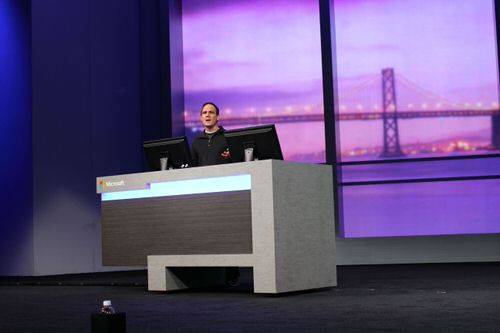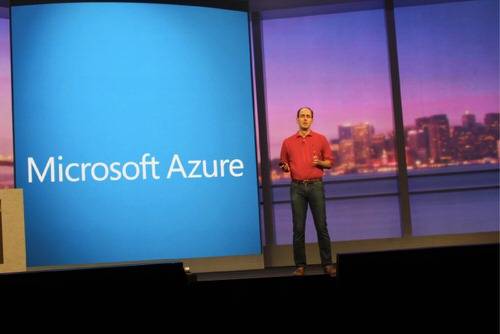The great cloud computing war of 2014 is in full pitch. Cloud storage providers continue to jockey for the chance to store all your digital data, they’re giving away more for free and dropping the prices for their paid add-ons. Microsoft wants to remind everybody that it has significant stake in the game. Today, Microsoft announced that it is now offering 15 GB (up from 7 GB) of storage on its personal cloud storage service OneDrive for free. If you use Office365, Microsoft ups the ante to one terabyte. Microsoft also decreased paid storage options by up to 80%.
“If you use Office, you don’t need to buy storage from anyone else,” said Angus Logan, director of marketing for OneDrive at Microsoft. “We give you more than enough to do what you need to do.”
But is it enough to make a difference? By most accounts, Microsoft’s cloud storage offering is decent, but it may be also-ran in a very crowded field. Data on the personal cloud storage market share is fairly scarce, but in a report released in March 2013 by Strategy Analytics, Microsoft didn’t even show up in the top 10. Apple was the leader, followed by Dropbox, Amazon Cloud and Google Drive.
You might think that Microsoft has a long way to go to catch up with Apple, or even Dropbox, which claims to have more than 300 million customers. OneDrive may not be as obviously popular when it comes to downloads, but it has one definite advantage—because Microsoft includes OneDrive with Office365 and Windows 8.1, Redmond claims more than 250 million people store data in it and that figure is about a year old.
“If you use Office, OneDrive is the best cloud for you,” Logan said.
OneDrive Digs At The Competition
Of course the director of marketing for OneDrive at Microsoft would tout it for Office users. That’s his job. But this isn’t the 1990s when option were limited. Users have plenty of other cloud storage options. Microsoft knows that customers don’t want to be locked in to a vendor’s product line and publishes application programming interfaces (APIs) so that developers can integrate their apps with OneDrive. “Customers can choose to save to Dropbox if they want,” said Omar Shahine, principal group program manager. OneDrive’s software development kit details ways for developers to integrate their apps with OneDrive so that a user can open or access files, or save documents to OneDrive. “We do have APIs and we think it’s important,” Shahine said. “If they are going to trust us with their information, they want to be able to access it it where it matters to them.”

When discussing competitors and alternatives to OneDrive, Logan compared OneDrive’s offerings to a few others, pointing out that Google also offers 15GB for free, but that storage gets shared among Google Drive, Gmail, and Picasa apps. He mentioned iCloud, with its free 5GB and Dropbox, which offers 2GB, but customers can earn more storage by referring other users. “You can go to work for them to earn more,” Logan said, in an apparent dig.
Strangely, Logan and Shahine didn’t mention Box as a competitor. I asked why. “I am not sure what Box does,” Logan said. “They’re an interesting one, because they are really an organization-focused product and they have a consumer proposition to spin up some demand,” he said, adding that they are “lopsided.” Box currently offers 10GB for free.
It is unclear how many Office365 and Windows customers are regularly using OneDrive. They may be using other cloud backup and sync services for their Office products like Excel and Word. Microsoft isn’t saying, but Logan did say that OneDrive’s daily mobile usage statics have increased threefold in the last six months. Of course, it’s easy to make large gains from small numbers.
Connective Tissue, Rather Than Storage
In the cloud wars, free storage is a way to lure you in. But Microsoft, Apple, Google, Amazon, DropBox and the rest of the cloud competitors have a different payoff in mind: your long term business via software subscriptions. Microsoft wants you to view OneDrive more strategically, more than just storage. “We don’t think it’s that interesting to sell someone a storage subscription, but a productivity solution where storage is a capability, and they can have 100% of what they want in the cloud,” Logan said.
People need one place for all the stuff they care about, including photos, videos, music, and documents, for work and for their personal lives and they want and a way to share it with friends. Microsoft, of course, wants OneDrive to be that one place where you can store everything you need.
To that end, Microsoft is adding some new features: photo and video sharing native to OneDrive, and a partnership with Walgreens to print photos directly from OneDrive without having to set up an account or handing over a credit card (Walgreens has long had an app that allows you to print your smartphone photos and pick them up at the store).
OneDrive is the “connective tissue for collaborative experiences,” Shahine said.
All In The Cloud
When Microsoft first launched SkyDrive, the predecessor to OneDrive (which Microsoft had to rebrand over trademark concerns earlier this year) it offered 25GB of storage for free, but a spokesperson said they noticed no one was using that much, so they lowered what they offered for free to 7GB, which was enough for many people at the time.

Times have changed. With the proliferation of smartphones, people taking more pictures and shooting more video and we need more space to store that digital data. Microsoft decided to increase the amount of free storage to 15GB value after watching the way people used Windows computers and smartphones via data they collected telemetrically, which told them that 75% of their users have less than 15GB on their local drives. Microsoft, like Apple and Google, wants you store all that data to its cloud.
With its links to Office365 and Windows 8.1, Microsoft OneDrive may gain ground against its competitors. Despite its various faults and stumbles, Office and Windows are still widely use in corporations and organizations around the world. With OneDrive’s lower prices, it may attract more paying customers. If you don’t have an Office365 subscription, but want to buy extra OneDrive storage, Microsoft just lowered the price by 80%, from 9.99 to $1.99 per month for 100GB. For a family sharing an account, up to five people get one terabyte each for $9.99 a month.
Microsoft wants you to know that they’re thinking beyond cloud storage. “What people actually need is really powerful experiences on top of the data that’s in the cloud,” Logan said. “They want to upload their photos and share them easily, or work on a document anywhere and collaborate with someone in real time.”
“A lot of the other players are doing straight up storage,” Logan said.
Logan and Microsoft lay the OneDrive branding on pretty thick. But with the price drop and increase in storage capabilities, Microsoft is serious about getting users in to its personal cloud service while remaining competitive in the ongoing cloud wars.
Photos of Microsoft Build 2014 via ReadWrite















